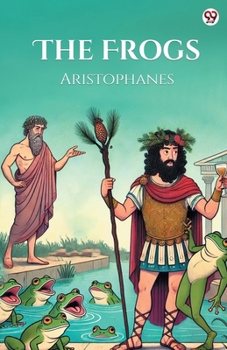The Frogs
Select Format
Select Condition 
Book Overview
The Frogs is a comedic play centered around a god's quest to restore the glory of Greek tragedy by bringing back a deceased playwright from the underworld. The narrative unfolds as the god embarks on a journey with his servant, humorously navigating the absurdities of the underworld. Their interactions reveal the god's comical yet somewhat cowardly nature, setting the tone for the play's satire. As they encounter various figures from Greek mythology, the story becomes a humorous exploration of literary and political issues. The characters debate the merits of different tragic playwrights, engaging in a comedic contest of wits and philosophies. Through sharp humor and satire, the play critiques the state of theater and intellectual life, offering a reflection on cultural values and the role of art in society. The absurdity of the god's journey, alongside the absurd characters and situations he encounters, creates a layered commentary on the world of ancient Greece. The work remains a classic example of the playwright s ability to blend humor, social critique, and the surreal.
Format:Paperback
Language:English
ISBN:9370818065
ISBN13:9789370818064
Release Date:April 2025
Publisher:Double 9 Books
Length:72 Pages
Weight:0.21 lbs.
Dimensions:0.2" x 5.5" x 8.5"
Customer Reviews
1 rating
Aristophanes's farcical attempt at dramatic criticism
Published by Thriftbooks.com User , 23 years ago
On the one hand Aristophanes's comedy "The Frogs" is a farce, but it is of more interest because it presents the earliest known example of dramatic criticism. Presented in 405 B.C., the play tells of how Dionysus, the god of drama, had to go to Hades to fetch back Euripides, who died the previous year, because Athens no longer had any great tragic poets left. The first part of the comedy involves Dionysus, who has disguised himself as Heracles, and his slave Xanthias on their way to Hades and features several interesting songs by the chorus of blessed mystics and the chorus of frogs. However, the high point of the comedy is the contest between Euripides and Aeschylus. Each of the two great tragic poets denounces the other and quotes lines from their own works to prove their superiority. We discover that Euripides writes about vulgar themes, corrupts manners, debases music and has prosaic diction. In contrast, Aeschylus finds obscure titles and is guilty of turgid prose. In the end Dionysus finds that artistic standards of judgment are useless and turns to a political solution. This makes sense since the problem facing Athens is a political one: what to do about the tyrant Alcibiades. What is most interesting is the implicit belief that the tragic poets had a social responsibility towards the audiences of their dramas. "Frogs," in addition to being one of the better comedies by Aristophanes, is also of interest because it contains the only fragments from several tragedies by Euripides and Aeschylus that have been long lost to us. As always, I urge that if you are studying Greek plays, whether the comedies of Aristophanes or the tragedies by those other more serious fellows, it is important to understand the particular structure of these plays and the various dramatic conventions of the Greek theater. This involves not only the distinction between episodes and stasimons (scenes and songs), but elements like the "agon" (a formal debate on the crucial issue of the play), and the "parabasis" (in which the Chorus partially abandons its dramatic role and addresses the audience directly).





